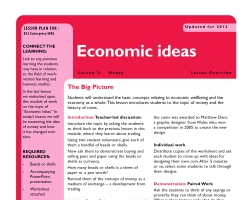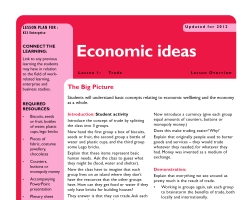WRL Lesson Plans / KS3 - Economic Ideas - 4 work-related learning lessons
KS3 - Economic Ideas - 4 work-related learning lessons
When was money invented? Why is it used? Students get to design their own money and learn about tax in this module.
These KS3 lessons include individual work, paired work and group activities as well as teacher led discussions and presentations.
For further studies at key stage 3 or key stage 4, try the financial capability activities in our 'Manage your Millions' lesson.
-
 TRS WRL Economy Lesson 2 PDF
TRS WRL Economy Lesson 2 PDF
-
 TRS WRL Economy Lesson 2 PPT
TRS WRL Economy Lesson 2 PPT
-
 TRS WRL Economy Lesson 1 PDF
TRS WRL Economy Lesson 1 PDF
-
 TRS WRL Economy Lesson 1 PPT
TRS WRL Economy Lesson 1 PPT

In this lesson students learn the basics about the tax they will pay as adults, and what it is spent on.
-
 TRS WRL Economy Lesson 4 PDF
TRS WRL Economy Lesson 4 PDF
-
 TRS WRL Economy Lesson 4 PPT
TRS WRL Economy Lesson 4 PPT
-
 TRS WRL Economy Lesson 3 PDF
TRS WRL Economy Lesson 3 PDF
-
 TRS WRL Economy Lesson 3 PPT
TRS WRL Economy Lesson 3 PPT
Economic Ideas Activities for Work-related Learning
As part of the programme of study for Economic well-being, it is important that students understand issues relating to the economic and business environment as well as the functions and uses of money. This series of key stage 3 teaching resources introduces various financial concepts to your pupils.
Lesson 1 –Trade
In the first activity, students work in groups to develop an understanding of the need for trade. As the concept is established and developed, pupils should start to realise the benefits of trading.
Lesson 2 – Money
Now, we turn our attention to money and how this has become an essential tool for trade. Students look at the history of currency and design their own coin.
Lesson 3 – Import and Export
In the first part of this lesson, we establish the meaning of the words import and export. This is followed by paired activities and demonstration of the knowledge learned.
Lesson 4 – Tax
In the final session, we explain about the different types of tax that will affect students as they become economically active. We also study a payslip to introduce the topics of national insurance, gross pay, net pay and tax codes.
Vocational Qualifications
These economic ideas lessons can be used to support learning outcomes for Preparation for Working Life - Economic and Financial Aspects of Life from AQA. These lessons are also suitable for use with Personal and Social Development Qualification - Managing Own Money, Employability - Exploring Business and Enterprise from ASDAN; Preparing for Employment, Key Skills and Workplace Core Skills - Managing Your Own Money from City & Guilds; Skills Towards Enabling Progression "Step Up" - Personal Budgeting, Economic Well-Being and Financial Capability - Budgeting and Money Management, Developing Skills for Employment - Financial Literacy and Money Management from NOCN; Employability Skills - Financial Capability from OCR.




